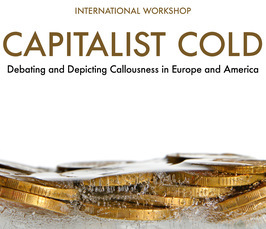Workshop: Capitalist Cold – Debating and Depicting Callousness in Europe and America
- Start: Dec 6, 2018 01:30 PM (Local Time Germany)
- End: Dec 7, 2018 04:00 PM
- Location: Max Planck Institute for Human Development, Lentzeallee 94, 14195 Berlin
- Room: Small Conference Room
- Host: Center for the History of Emotions

The Center for the History of Emotions at the Max Planck Institute for Human Development, led by Prof. Ute Frevert, cordially invites all interested to attend the following event:
International Workshop
Capitalist Cold – Debating and Depicting Callousness in Europe and America
Dickens’ novel "Hard Times" was a fictional contribution to the broader criticism of the emerging class of industrialists in Great Britain. Yet, in contrast to the negative depictions encountered in many novels, treatises, newspapers, and visual material, this group was rather heterogeneous.
Nearly half a century before Dickens’ story, the mill owner Robert Owen, had took it upon him to oppose his own class’s descent into emotional disinterestedness: lamenting that an unnatural and problematic desire for wealth and luxuries had “generated a disposition which strongly impels its possessors to sacrifice the best feelings of human nature to this love of accumulation” (Observations on the Effect of the Manufacturing System, 1815), Owen developed what is now known as one of the earliest examples of planned settlement and benevolent patriarchal social responsibility on the part of employers, the Scottish New Lanark cotton mills near Glasgow (a UNESCO world heritage site since 2001).
Owen’s philanthropic and utopian approach to society, through which he wished to improve the conditions of every man and woman while still trying to negotiate financial aspects, which were, after all, indispensable for any social welfare, was just one of many nineteenth-century instances of idealism clashing with and trying to soften callousness and insensitivity: whether in the economy, the slave trade, the military, the medical profession, and, to some extent, the church—the lack of feeling apparently present in various settings was extensively discussed and criticised. But what does unfeelingness – and its adjacent concepts such as callousness, insensitivity, cold-heartedness, uncaringness—actually mean in those contexts? Are people lacking or are they suppressing emotions? Is it a real feature, an expectation, or a typological structure by which—as in Dickens—an entire group is characterised? And is it believed to be inherent or acquired, and, importantly, can it be altered or unlearned?
This two-day workshop, which will take place at the Max Planck Institute for Human Development in Berlin from 6 to 7 December 2018, aims to address these questions from an interdisciplinary vantage point. It will explore the intersection between unfeelingness—alternately understood as acquired callousness or genuine indifference—as an inherent human characteristic and an external attribution in Europe and America from ca. 1840 to the present in historic sources and literary and visual culture.
Registration as guest is open until 4 December 2018.